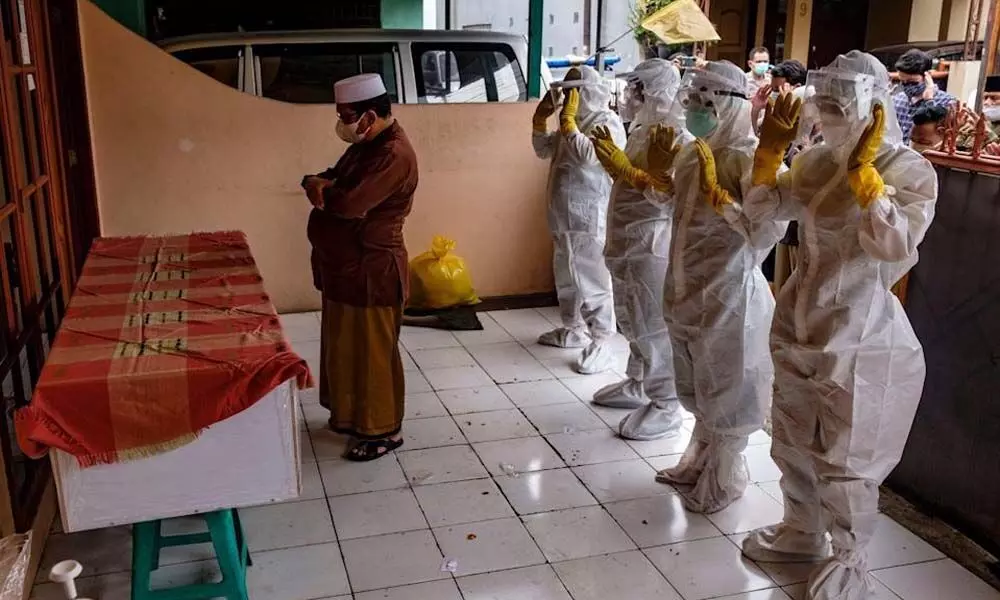Live
- Kejriwal writes to HM Shah on law and order, seeks urgent meeting
- Big e-commerce firms to adopt Safety Pledge on National Consumer Day
- Cop ends life over torture by wife, father-in-law in Bengaluru
- Indian Constitution longest and most beautiful, Kiren Rijiju lauds its inclusive character
- BSNL's Rs 333 Plan Challenges Airtel and Jio with 1300GB Data: Details
- PM Modi's appeal to buy Khadi garments leads to huge demand in Bihar's Samastipur
- Mohammad Amir announces retirement from international cricket
- Chandrababu supports One Nation, One Election System, says elections in 2029
- Cong not pursuing politics of vengeance: D. K. Shivakumar on Covid 'scam' FIR
- Mexican consulates to strengthen support for nationals in face of US deportation
Just In
Indonesia's Daily Cases Surge Past India, Marking New Covid Epicenter


Indonesia’s Daily Covid Cases rises
Indonesia surpassed India’s daily Covid-19 case numbers.
Indonesia surpassed India's daily Covid-19 case numbers, marking a new Asian virus epicenter as the spread of the highly-contagious delta variant drives up infections in Southeast Asia's largest economy.
The country has seen its daily case count cross 40,000 for three straight days -- including a record high of 54,517 on Wednesday -- up from less than 10,000 a month ago. Officials are concerned that the more transmissible new variant is now spreading outside of the country's main island, Java, and could exhaust hospital workers and supplies of oxygen and medication.
Indonesia's current numbers are still far from India's peak of 400,000 daily cases in May, and its total outbreak of 2.7 million is barely a tenth of the Asian giant's 30.9 million. India, with a population roughly five times the size of Indonesia's 270 million people, saw daily infections drop below 39,000 on Wednesday as its devastating outbreak wanes.
The Southeast Asian country reported about 900 deaths daily on average in the past seven days -- compared to just 181 a month ago -- while India reported an average of 1,027 daily fatalities.
Indonesian stocks declined on Wednesday, with the Jakarta Composite Index recording a two-day decline of about 2%. The measure entered correction territory in May, and remains more than 7% below a January peak.
Developing countries are struggling to contain the virus -- especially delta's rapid spread -- even as vaccine rollouts are allowing life to return to normal in countries like the U.S. and U.K.
The outbreak in Indonesia underscores the consequences of an unequal global distribution of vaccines that has seen richer countries gobble up more of the supply, leaving poorer places exposed to outbreaks of variants like delta. World Health Organization director-general Tedros Adhanom Ghebreyesus has called the growing divide a "catastrophic moral failure."
Indonesia has administered vaccines to cover just 10% of its population and India 14%, compared to 46% of the European Union's population and 52% in the U.S., according to Bloomberg's Vaccine Tracker. Lacking enough immunizations, the developing world is bearing the brunt of rising case counts and death tolls, with global fatalities reaching 4 million earlier this month.
Health authorities have blamed supply constraints for the sluggish pace of Indonesia's vaccine rollout. The country has averaged just over 700,000 shots administered daily in July, well below its target of 1 million. Officials aim to raise that goal to 2 million next month with more doses set to arrive, allowing the inoculations to expand to all adults and teenagers.
The country administered 2.4 million doses on Wednesday, a fresh record high.
Indonesia's positive Covid test rate has reached about 31%, while India's rate is 2%. Larger numbers indicate a government is only testing the sickest patients, and that there are high levels of undetected infection in the community. Experts say both nations are under-counting cases and deaths by a wide margin given their lack of testing infrastructure.
Curbs imposed on Java and tourism spot Bali from July 3-20 haven't eased people's movements as much as the government had expected, with officials signaling that the restrictions may be extended.
Residents' mobility has only eased by 6% to 16% since the restrictions were put in place, whereas authorities had expected a 20% drop, Health Minister Budi Gunadi Sadikin said in a hearing with lawmakers on Tuesday. The government had earlier said that a 50% reduction in mobility was needed to reduce the virus's spread.
"Our hospitals can't endure it anymore if we fail to reduce movement by at least 20%," Sadikin said.

© 2024 Hyderabad Media House Limited/The Hans India. All rights reserved. Powered by hocalwire.com






